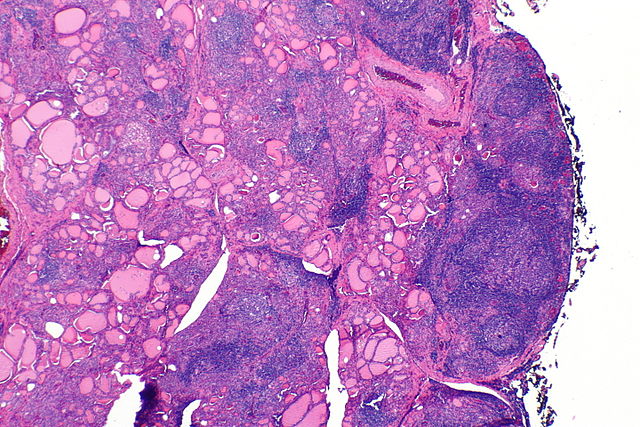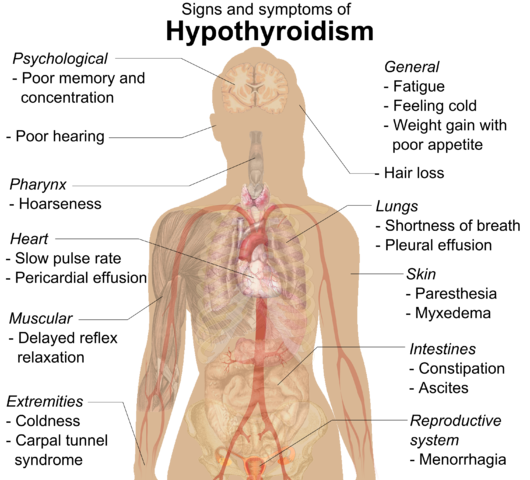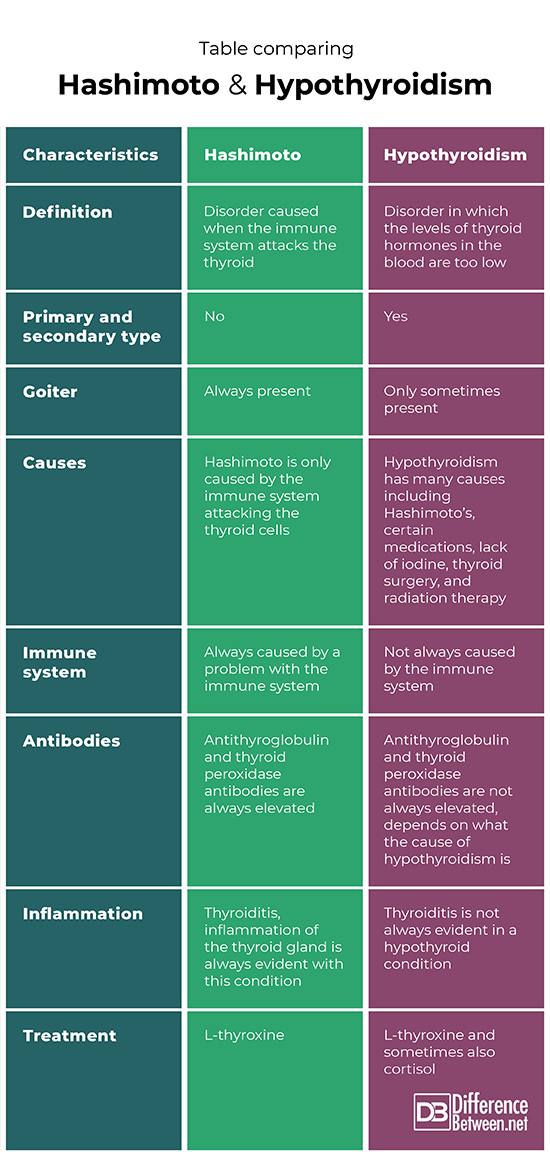Difference Between Hashimoto and Hypothyroidism
Hashimoto is when the immune system produces antibodies that attack the tissues of the thyroid gland. Hypothyroidism is a condition in which the thyroid produces too few hormones for one reason or another.
What is Hashimoto?
Definition:
Hashimoto is a disease in which a person’s thyroid gland is attacked by their own immune system resulting in problems in how many hormones are then secreted by the gland.
Symptoms:
The main symptom is an increase in the size of the thyroid, and hence a feeling of fullness in a persons’ neck. This swelling is called a goiter and may be externally visible. The thyroid, although enlarged, is not painful though. Other symptoms include a patient showing signs of too little or too many thyroid hormones. Hypothyroidism symptoms such as weight gain, feeling sluggish, and signs and symptoms associated with a slow metabolic rate often occur in Hashimoto disease.
Diagnosis:
Tests can be done to determine the levels of thyroid stimulating hormone (TSH) and thyroxine hormone (T4). The presence of high levels of antibodies in the blood, such as antithyroglobulin and thyroid peroxidase antibodies are an indication of the condition. Levels of TSH and T4 may change later in the disease but may be normal if the disorder is in the early stages. Ultrasonography can be used for diagnosis particularly if bumps can be felt in the neck. This test would then show these nodules as dark masses in the thyroid.
Treatment:
Most patients with Hashimoto disease need to have thyroid hormone replacement treatment for the remainder of their lives. This is usually in the form of L-thyroxine hormone that is given each day.
Causes and risk factors:
Women who have a family history of Grave’s disease or Hashimoto’s are at increased risk of developing Hashimoto’s as they grow older. Scientists have also found a common genetic link between both these autoimmune diseases.
What is Hypothyroidism?
Definition:
Hypothyroidism is the condition that a person has when the levels of thyroid hormones in their bloodstream are too low. The disease can also be divided into a primary type which is related to the thyroid, and a secondary type that is related to the pituitary gland and hypothalamus.
Symptoms:
There are many signs and symptoms that can point to the condition of hypothyroidism. Patients often gain weight because of a drop in metabolic rate, and they feel cold more often than normal. They may also suffer from constipation and have a decreased heart rate. The face may seem puffy and hair becomes coarse. Patients may also become depressed and more forgetful than usual.
Diagnosis:
Blood tests to examine levels of TSH and T4 are done. The TSH levels are often noticed to be higher than normal if a person has hypothyroidism. Levels of T4 hormone are usually lower than usual.
Treatment:
The usual treatment is for patients to be given L-thyroxine to compensate for the low hormone levels unless the cause is secondary hypothyroidism in which case the levels of cortisol have to first be verified or supplemented in patients.
Causes and risk factors:
Hypothyroidism can sometimes be caused by autoimmune conditions such as Hashimoto disease or it can be a result of thyroid surgery or radiation treatment. Certain medications such as lithium can also cause hypothyroidism. In addition, some women develop the disorder during pregnancy and some babies are born with congenital hypothyroidism. A lack of iodine in the diet can also cause the problem but in most countries, this is rare today since iodine is added to table salt.
Difference between Hashimoto and Hypothyroidism?
-
Definition
Hashimoto disorder is the condition where the immune system attacks the thyroid gland. Hypothyroidism is the condition where too few thyroid hormones occur in the blood.
-
Primary and secondary type
Hashimoto disease does not have a primary and secondary type since it always concerns a problem with the thyroid gland. Hypothyroidism has a primary and secondary type since it can also concern problems with the hypothalamus and pituitary.
-
Goiter
In Hashimoto disease, a goiter is present in the neck region. In hypothyroidism, a goiter is not always present.
-
Causes
Hashimoto is only caused by one problem, which is an issue with the immune system. Hypothyroidism has many causes besides the immune system and can be caused by certain types of medication, a lack of iodine in the diet, and radiation therapy.
-
Immune system
Hashimoto disease is always caused by a problem with the immune system, while hypothyroidism is not always caused by an immune system problem.
-
Antibodies
Antithyroglobulin and thyroid peroxidase antibodies are always elevated in the case of Hashimoto disease. The antithyroglobulin and thyroid peroxidase antibodies are not always elevated in the case of hypothyroidism.
-
Inflammation
Thyroiditis, in which the thyroid gland is actually inflamed, is typically evident in Hashimoto. Such inflammation is not always evident in patients who have hypothyroidism.
-
Treatment
Hashimoto disorder requires treatment with L-thyroxine. Hypothyroidism sometimes requires treatment with L-thyroxine, but in some cases, cortisol has to be given first and then L-thyroxine.
Table comparing Hashimoto and Hypothyroidism
Summary of Hashimoto Vs. Hypothyroidism
- Hashimoto’s disease is an autoimmune condition in which the immune system attacks the thyroid tissue.
- Hypothyroidism is the condition in which the levels of thyroid hormones found in the bloodstream are too low.
- Hashimoto’s disorder often leads to hypothyroidism, but there are many other causes of hypothyroidism.
- Both Hashimoto’s and hypothyroidism can be treated with injections of the hormone L- thyroxine.
- Difference Between Rumination and Regurgitation - June 13, 2024
- Difference Between Pyelectasis and Hydronephrosis - June 4, 2024
- Difference Between Cellulitis and Erysipelas - June 1, 2024
Search DifferenceBetween.net :
Leave a Response
References :
[0]Hershman, Jerome M. “Hashimoto thyroiditis”. Merck Sharp & Dohme Corp., 2018, https://www.msdmanuals.com/professional/endocrine-and-metabolic-disorders/thyroid-disorders/hashimoto-thyroiditis
[1]Hershman, Jerome M. “Hypothyroidism”. Merck Sharp & Dohme Corp., 2018, https://www.msdmanuals.com/professional/endocrine-and-metabolic-disorders/thyroid-disorders/hypothyroidism
[2]Strieder, Thea GA, et al. "Risk factors for and prevalence of thyroid disorders in a cross‐sectional study among healthy female relatives of patients with autoimmune thyroid disease." Clinical endocrinology 59.3 (2003): 396-401.
[3]Image credit: https://upload.wikimedia.org/wikipedia/commons/thumb/9/9f/Signs_and_symptoms_of_hypothyroidism.png/530px-Signs_and_symptoms_of_hypothyroidism.png
[4]Image credit: https://upload.wikimedia.org/wikipedia/commons/thumb/5/51/Hashimoto_thyroiditis_-_alt_--_very_low_mag.jpg/640px-Hashimoto_thyroiditis_-_alt_--_very_low_mag.jpg



